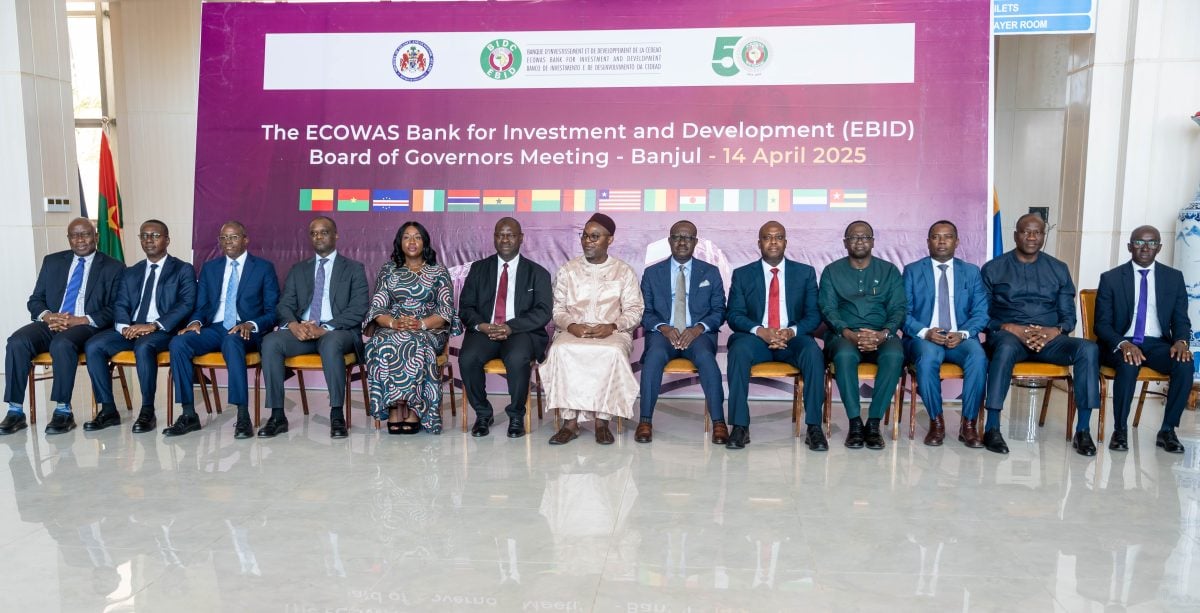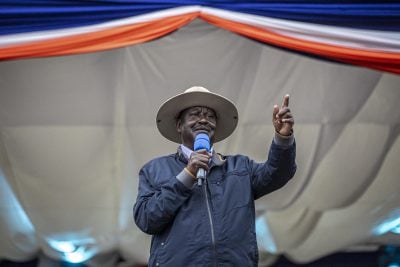This article was produced with the support of ECOWAS Bank for Investment and Development
In a demonstration of renewed commitment to economic cooperation and sustainable development in West Africa, the ECOWAS Bank for Investment and Development (EBID) convened its 23rd Ordinary Session of the Board of Governors on 14 April 2025 in the serene coastal city of Banjul, The Gambia. The annual meeting brought together high-level representatives from across the ECOWAS region, including Ministers of Finance and Planning—the principal custodians of the Bank’s strategic direction and governance.
Chaired by Honourable Seedy K. M. Keita, Minister of Finance and Economic Affairs of The Gambia and the outgoing Chair of the Board, the session marked a pivotal moment for the institution as it reviewed key performance metrics, initiated governance transitions, and set forth bold aspirations for regional economic transformation. The meeting was elevated by the presence of His Excellency Muhammed B. S. Jallow, Vice President of the Republic of The Gambia, representing President Adama Barrow.
As West Africa continues to confront multifaceted challenges ranging from fiscal pressure to food insecurity and sluggish intra-regional trade, the gathering of EBID’s apex decision-making body offered both a platform for reflection and a springboard for ambition.
Strategic Oversight Amid Economic Turbulence
The Board of Governors of EBID, comprising Ministers responsible for finance and planning across the ECOWAS Member States, deliberated extensively on the governance and strategic trajectory of the Bank. Key agenda items included the approval of the 2024 annual activity report, the adoption of financial statements, the constitution of the new Board of Directors, and the election of a new Chairperson.
Delivering his welcome address, Dr George Agyekum Donkor, President and Chairman of the Board of Directors of EBID, commended the outgoing Chairman for his steady stewardship and acknowledged the invaluable support of the Governors. Reflecting on the Bank’s financial performance, Dr Donkor highlighted a year of robust growth in 2024, during which EBID more than doubled its loan portfolio and almost doubled its overall balance sheet—a testament to its evolving operational efficiency and enhanced sectoral targeting.
Notably, the Bank posted a profit increase of 12.86% over the previous year. “This growth,” Dr Donkor noted, “can be attributed to a combination of factors including increased disbursements, strategic focus on high-impact sectors, and improved resource mobilisation mechanisms.”
A New Chair and a Renewed Mandate
One of the most significant outcomes of the session was the election of Honourable Dr Cassiel Ato Baah Forson, Minister of Finance of the Republic of Ghana, as the new Chairperson of the EBID Board of Governors. His appointment comes at a time when the region is calling for greater innovation and financial agility from multilateral development banks like EBID.
Dr Forson’s leadership will be instrumental in reinforcing the Bank’s mandate to support Member States through concessional financing, private sector stimulation, and regional infrastructure projects, particularly under the framework of the ECOWAS Vision 2050 and the Bank’s Strategy 2025.
Innovative Financing and Private Sector Engagement
In his keynote address, Vice President Muhammed B. S. Jallow issued a clarion call for EBID to broaden its toolkit of financial instruments. Emphasising the growing need for Member States to pursue development goals without exacerbating their debt burdens, he urged the Bank to “explore more innovative and transparent off-balance sheet financing products.”
The Vice President also advocated for the establishment of trade finance lines dedicated to private sector actors importing goods from within the ECOWAS region. “There is an urgent need,” he said, “to boost intra-regional trade and production through targeted private sector support mechanisms.”
This message resonated with the broader sentiment across the Board of Governors—namely, that regional development banks must increasingly act as catalysts for structural transformation.
Agricultural Investment: A USD 10 Million Boost for Food Security
Among the landmark developments of the session was the signing of a USD 10 million public sector loan facility between EBID and the Government of The Gambia. The facility will be channelled towards the National Food Security Processing and Marketing Corporation (NFSPMC) as part of the implementation of the second-generation National Agricultural Investment Plan for Food and Nutrition Security (GNAIP II-FNS).
This initiative aims to enhance agricultural productivity, improve food security, and increase value addition in agri-processing—a critical sector for both economic diversification and poverty alleviation in the subregion.
The loan facility aligns with EBID’s strategic focus on investing in key sectors such as agriculture, technology, industry, and transport. Dr Donkor reiterated the Bank’s intention to support initiatives that deliver measurable socio-economic benefits, particularly for vulnerable communities across West Africa.
The Road Ahead: Towards Deeper Regional Integration
As ECOWAS moves forward with its integration agenda—encompassing a single currency, borderless trade, and harmonised infrastructure—EBID’s role as the financial engine of regional development has never been more pronounced.
The Bank’s 2024 achievements, including profitability, balance sheet expansion, and the deepening of its project pipeline, reflect a strengthened institutional capacity. However, the path ahead will demand even greater responsiveness to geopolitical volatility, climate risks, and demographic pressures.
EBID’s pivot towards more diversified financial instruments, increased engagement with the private sector, and greater transparency in operations will be key to unlocking the region’s vast potential.
A Turning Point for Regional Development Finance
The 23rd Ordinary Session of the EBID Board of Governors signified more than an annual statutory engagement—it was a reaffirmation of shared aspirations among West African nations to harness collective economic strength.
The appointment of a new Chair, the launch of a key food security project, and the endorsement of strong financial results serve as indicators of a dynamic and forward-looking institution. Yet, the calls for innovation, deeper trade linkages, and inclusive financing underscore the urgency of adapting to new realities.
As the region grapples with both legacy and emerging challenges, EBID remains a cornerstone of hope—an institution positioned to convert vision into action, and policy into prosperity.
With effective leadership, enhanced governance, and a strategic shift towards sustainable finance, EBID is poised to remain not only relevant but indispensable in shaping the economic future of the ECOWAS region.

 Sign in with Google
Sign in with Google 



